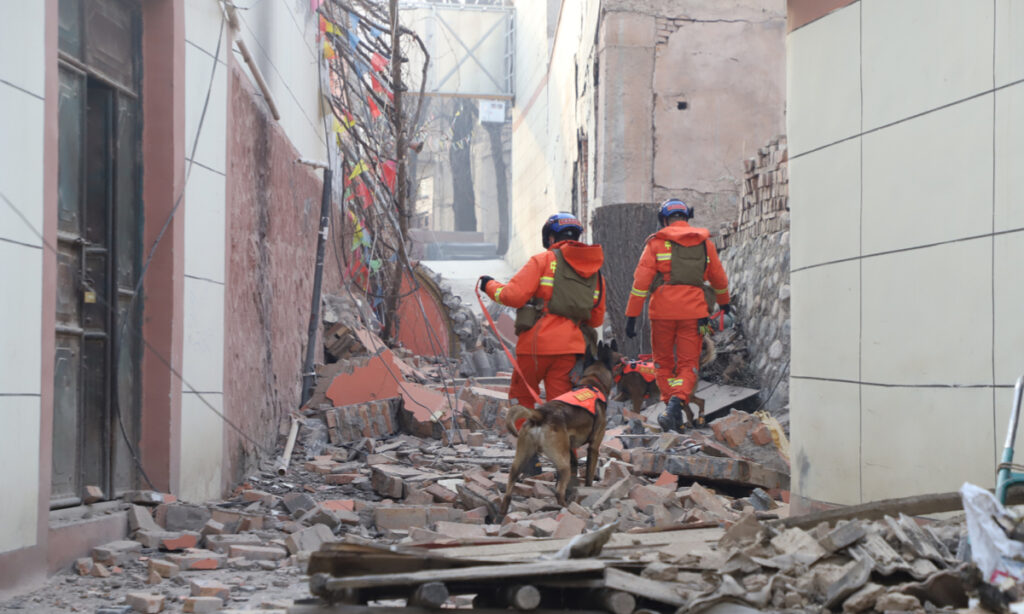More than 700 people were injured in the two provinces and dozens more were reported missing; more than 155,000 houses were damaged or collapsed, according to media reports. Infrastructure related to water, electricity, telecommunication, and roads around the epicenter of Jishishan county of Linxia Hui Autonomous Prefecture in Gansu have also been damaged to varying degrees.
President Xi Jinping has urged all-out search and rescue efforts and proper arrangements for affected people to ensure the safety of people’s lives and property. He also urged allocation of relief supplies to the affected regions as soon as possible, repair of damaged infrastructure such as electricity, communications, transportation and heating, and proper accommodation of the affected people to ensure their basic living needs, the Xinhua News Agency reported on Tuesday.
The Ministry of Finance and the Ministry of Emergency Management allocated on Tuesday 200 million yuan ($28 million) of central emergency response fund to the quake-stricken areas.
The State Council’s Earthquake Relief Command and the Ministry of Emergency Management have raised the national earthquake emergency response to Level II. The national disaster relief emergency response has also been elevated to Level III.
A Y-20 large transport aircraft from the Air Force of the People’s Liberation Army Western Theater Command arrived in Lanzhou, capital city of Gansu, on Tuesday noon to deliver the emergency command group and supplies.

A Y-20 large transport aircraft from the Air Force of the People’s Liberation Army Western Theater Command is dispatched to Gansu Province on December 19, 2023 to deliver the emergency command group and supplies to earthquake jolted areas. Photo: VCG
China’s home-developed Wing Loong-2H emergency relief unmanned aerial vehicle (UAV) have also been deployed, the Global Times learned from the Aviation Industry Corporation of China. Upon arrival at the disaster zone, the drones will carry out emergency communication support and disaster reconnaissance, among other tasks.
More than 1,500 firefighters, 1,500 police officers, and 1,000 PLA soldiers have been dispatched to the disaster-stricken area, Gansu authorities revealed. Coordinating departments also urgently transported the first batch of emergency supplies to the affected region, including cotton tents, folding beds, blankets, stoves, and more.
The National Health Commission (NHC) sent out a team of medical experts and ordered medical teams from nearby provinces to assist the affected region. More than 100 ambulances were dispatched to transfer the injured.
NHC is working together with local medical staff to systematically screen for hidden injuries, and has already developed individualized diagnosis and treatment plans.
A total of 386 medics from hospitals within Gansu have formed 19 teams to aid the rescue and treatment in Jishishan county and other places in Linxia prefecture.
According to Xinhua, 279 out of 314 telecommunication base stations in Jishishan county have resumed operation and power supply returned for 88 percent of local households as of Tuesday afternoon.
At a temporary shelter in Dahe village, Jishishan coutnty, the Global Times saw local government staff preparing hot food, drinks and instant noodles for victims. About 130 tents were built and each can accommodate five people.
Dahejia Middle School is located in the severely affected Jishishan county. The school principal, surnamed Ma, told the media that all 2,100 students and 190 teachers have safely returned home without injuries. “We have conducted frequent drills at our school for fire and earthquake safety. In critical situations, our teachers were able to quickly evacuate the students,” Ma said, adding that more than 1,500 students and all the teachers in school live on campus.
The principal recalled that when the tremor began late Monday night, they first heard a loud bang and then realized that the entire building was shaking. “The teachers soon found that many doors couldn’t be opened as they were deformed by the quake. Several male teachers worked together to strike open all the doors.” As the school lost power amid the quake, students helped each other by shaking everyone awake, while the teachers ran into each dormitory to evacuate the students. “It only took about 5 minutes to evacuate the entire school,” Ma said.
Preliminary analysis of the cause of the earthquake indicates a thrust rupture. Within a 200-kilometer radius of the epicenter, there have been three quakes measuring magnitude 6 or higher since 1900.
There also remains possibility of strong aftershocks with magnitude 5 or higher in the epicenter in the coming days, based on seismic zone analysis, local officials in Gansu warned.
Hours after the quake in Gansu, another 5.5-magnitude quake struck the city of Artux in the neighboring Xinjiang Uygur Autonomous Region at 9:46 am on Tuesday, according to the China Earthquake Networks Center. No casualties have been reported as of press time.
Relief complex
Analysts explained that the relatively large casualties and losses resulted from its high intensity and the shallow depth of epicenter. The seismic resistance of the affected-region’s buildings is lower than that of the developed regions, the epicenter is a densely populated county, and the timing of midnight also aggravated the situation.
Secondary disasters also pose challenges to the disaster relief. Mountain landslide occurred in a village in Minhe county neighboring Jishishan, which trapped residents and buried several houses.
Yan Wei, deputy director of China’s civilian rescue organization the Blue Sky Rescue Team’s Gansu branch, told the Global Times on Tuesday that the disaster situation in the local region is severe as 70 to 80 percent of the houses have collapsed in areas around the epicenter.
Yan said that local communication and transportation were also damaged to different degrees, but rescue vehicles are still able to reach the epicenter despite the damages.
Experts reached by the Global Times also warned that the sweeping cold wave and the drastic drop in temperatures have posed another major challenge. The typical golden rescue time window for earthquakes is 72 hours, but this time it is likely to be shortened due to the bitter cold weather, analysts said.
The temperatures drop to -14 C at night, which is a big problem, said Yan. “Many villagers were left without shelters after their houses collapsed. The rescue forces, right after arrival, started building hundreds of tents. They also provided instant noodles and hot water. The situation is improving.”
Global Times




